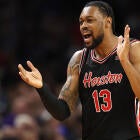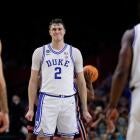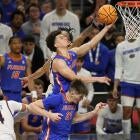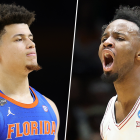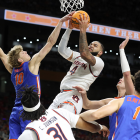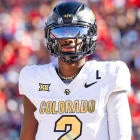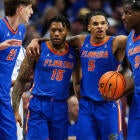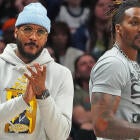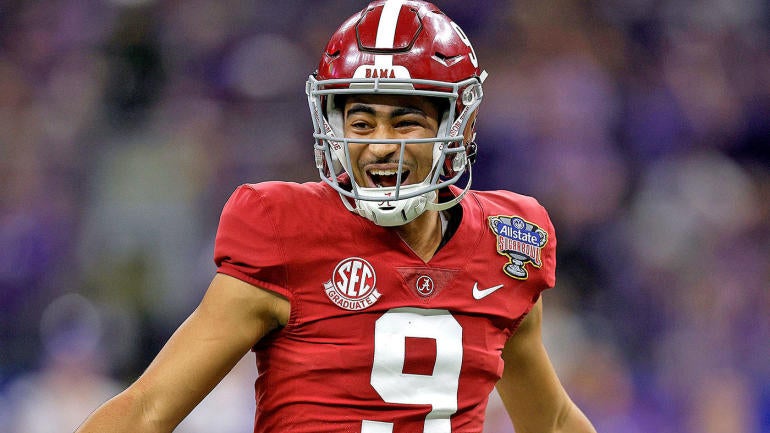
In theory, when a quarterback is getting No. 1 overall hype, teams want all the boxes to be checked. Alabama quarterback Bryce Young won't be able to check all the boxes.
The 21-year-old is incredibly poised beyond his years. He throws with NFL-veteran-level anticipation and creates off structure as a runner and outside-the-pocket passer naturally as any quarterback prospect since Patrick Mahomes.
Young, too, will be unprecedentedly small for the position as a professional. Especially for a top-tier quarterback prospect. And that will undoubtedly scare teams considering the former Heisman winner within the first few selections of the 2023 NFL Draft. But does height and weight matter at the quarterback position in the NFL? With Young, the answer is complicated.
At the NFL Scouting Combine in Indianapolis on Saturday, Young's official measurements were as followed: 5-foot-10 and 1/8 inch tall weighing 204 pounds with 9 and 1/2 inch hands. Here's how Young compares to some notably small, high-caliber quarterback prospects measured in at their respective combines over the past 25 years.
| Height | Weight | |
|---|---|---|
| Bryce Young, 2023 | 5-10 1/8 | 204 |
Kyler Murray, 2019 | 5-10 1/8 | 207 |
Baker Mayfield, 2018 | 6-0 5/8 | 215 |
Russell Wilson, 2012 | 5-11 | 204 |
| Drew Brees, 2001 | 6-0 | 213 |
For those concerned about Young's size, he has almost identical measurements to Kyler Murray, who the Arizona Cardinals took No. 1 overall in the 2019 NFL Draft. And even if teams shy away from Young's slight frame, is there a reason to?.
As an evaluator, I don't grade specifically on size alone at the quarterback position. Size, directly, does not hinder or elevate a quarterback at the NFL level. It's what typically comes with size -- or lack thereof -- that does either of those things. Usually, large quarterbacks have stronger arms and the opposite is true with those who lack size.
In the case of Wilson, Mayfield and Murray, they were exceptions. Each had above-average NFL arms despite falling well short of normal starting quarterback size standards. If you simply watched the velocity of the ball out of their hands, or how effortless they ripped it downfield, you would've never guessed they were right around 6-0. Brees was an outlier because of his lightning-quick processing and surgical accuracy, one of the most striking combinations of that kind in NFL history.
The red-flaggy problem with Young is, he doesn't have a big arm and isn't ridiculously accurate with the football at all levels. That scares me. There's a difference between being short and being small. Young is the smallest of the above group of quarterbacks and doesn't have a monster arm. Yes, he reads the field well and doesn't have ball-placement issues. He's nowhere near as accurate as Brees was, and while he ad-libs awesomely, he doesn't possess Murray's explosiveness or top-end speed.
There's no concrete evidence that suggests larger quarterbacks stay healthier than smaller ones, but a body like Young's feels more susceptible to injury on big hits from large defenders than a 6-4, 220-pound passer.
Size for Wilson, Mayfield and Murray didn't bother me. At all, really. They all were highly productive quarterbacks with strong arms -- by NFL standards -- and had standout quarterback traits. Young's creativity, accuracy and anticipation are outstanding. His arm strength is not special. His change-of-direction is, but he doesn't fly, and to be a competent scrambler in today's NFL, you have to be really, really fast.
There are signs that Young may ultimately have a long, successful NFL career. He could be another outlier. But measurables and traits are priorities during the draft process. And Young simply doesn't have classic measurable or out-of-this world traits, which make him one of the more polarizing possible No. 1 overall picks in a long time.
![[object Object] Logo](https://sportshub.cbsistatic.com/i/2020/04/22/e9ceb731-8b3f-4c60-98fe-090ab66a2997/screen-shot-2020-04-22-at-11-04-56-am.png)









